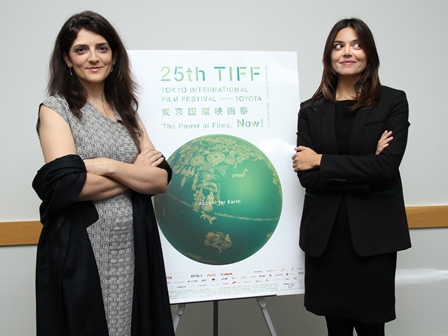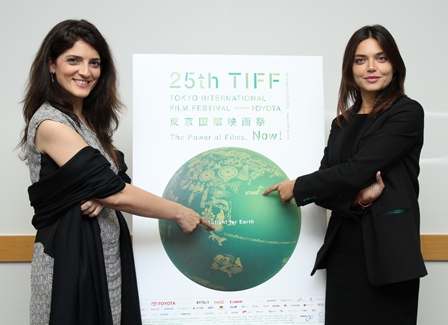Interview with Director Elisa Fuksas and Editor Natalie Cristiani (“Nina“)

Beautiful, lonely Nina spends a summer by herself in Rome. She seems to live in a shell, passing through structures and deserted streets depicted as models of symmetry and perspective.
–It feels as if the heroine is locked away in the scenery.
Elisa Fuksas: I suppose so. As you pointed out, there are symmetrical compositions and compositions that follow a classical perspective aesthetic, but I don’t really like symmetry. In any case, it’s true that the heroine, my alter-ego, exists in such a space.
-You mean there’s a generational feeling.
Fuksas: Yes.
–In that sense, when you were children in the early 1990s did your generation see and hear about the large-scale political corruption that was exposed? Almost all legislators were involved, and politics was revealed as being corrupt. It must have been very disappointing
Fuksas: Yes, it was. I can’t trust the state. The government of Italy has always been changing, so I don’t expect my country to protect me. The only thing you can rely on is your family. The current situation in Italy right now is very bad. It’s worse than being poor.
–What did you mean when you said that Nina is your alter ego?
Fuksas: I mean it in a personal way in terms of soul or emotion. She thinks things are far away, and I share with her that feeling of distance. Also, Nina suppresses her feelings, which is something I do, too. Nina does many things, but she doesn’t know what she wants. She’s very unstable. She doesn’t hold any hope for the future. She acts in plays, she sings, she thinks she wants to travel to China. Actually she’s a good singer and a talented theater performer. But she doesn’t know what she wants to do.
–In that regard, I got the impression she was quite fashionable rather than worried.
Fuksas: Nina is my heroine, something I created. Although the things I embrace can be chaotic and ugly, I change them into a beautiful work of art instead of just recycling them, because that’s the role of art.
–How did you choose the locations in Rome?
Fuksas: I was born in Rome, but I deliberately chose places that aren’t considered typically Roman for the film. These locations are not ruins or famous sightseeing places, but rather spots that seem futuristic, where I tried to convey a feeling for our unstable times, where you can’t project the future at all. Nina’s feeling is not at all abnormal, it’s quite common among my generation.
–The Euro district was built by Mussolini during the Fascist era, right? In a TV documentary Pier Paolo Pasolini once said it represented the ancient Roman empire and cursed it as the ugliest of places.
Fuksas: I didn’t know Pasolini said that. You’re right, the area was created by Mussolini, but in this movie there’s no political meaning behind its appearance. Pasolini may have hated it, but Fellini apparently was very fond of it. He used it in “Boccacio ’70.”
–In the movie “Caro diario” Nanni Moretti had his protagonist ride a Vespa in Rome in the summer.
Fuksas: That was one of Moretti’s more personal movies, so it has that in common with my film. Incidentally, when I finished writing the script for this movie, I asked Sandro Petraglia, a veteran scriptwriter who worked on the screenplays of several Morretti movies (“Bianca,” “La messa e finita”), to read it over. He appreciated the fact that I described in detail something that had puzzled him in the past. He had wondered why young Italian directors nowadays had betrayed cinema, why they just made movies describing why they couldn’t work. He finally understood, and encouraged me by saying it was important that I made this film. And I made it with other people of my generation. Usually, the first film by a new director is made with the help of veterans, but my case was different. Working with women my age I could communicate my ideas directly, and we made something worthwhile.
–The editor Natalie Cristiani is here in Tokyo. How did that collaboration work out? Were there any differences of opinion?
Fuksas: We had no disagreements. It was a very cooperative relationship.
-Any future projects?
Fuksas: This movie addressed a very personal theme. My next film will be quite different.

Interview by Chiseko Tanaka (film critic)



















